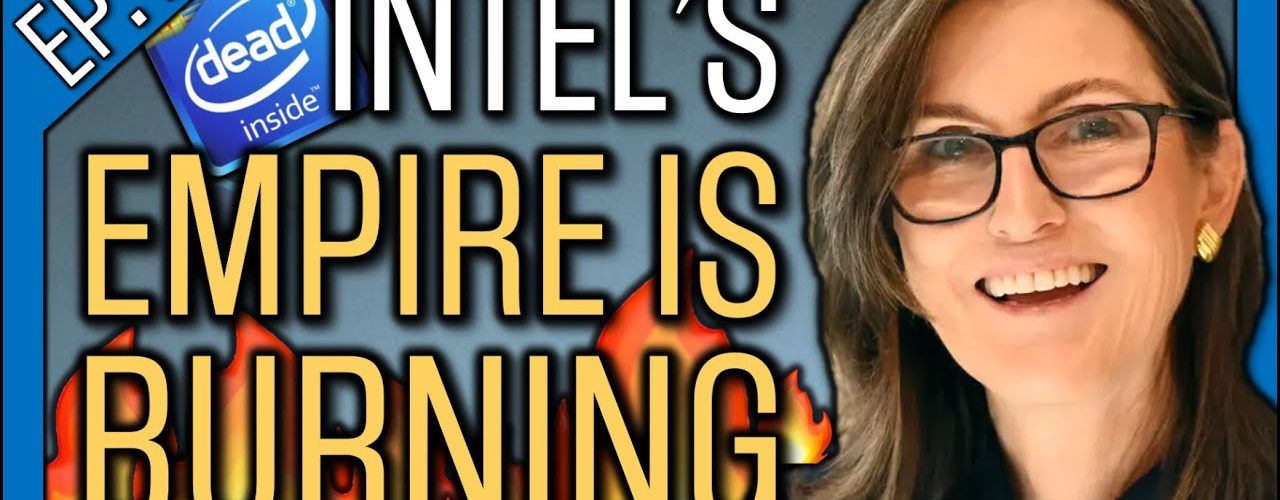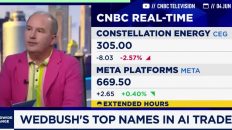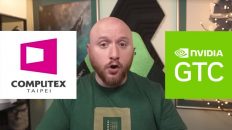Mentioned in Video:
- Stocks mentioned in this video: #AAPL, #AMD, #AMZN, #MSFT, #NVDA
- Increasing in Share of Developers, Apple and Amazon Could Topple Intel’s x86 Empire (ARK Invest): https://ark-invest.com/articles/analyst-research/developers/
- ARK Invest's Big Ideas 2021: https://ark-invest.com/big-ideas-2021/
- Apple: A New Era For The PC (Seeking Alpha): https://seekingalpha.com/article/4420499-apple-new-era-for-pc
- Cost Analysis – An x86 Massacre: https://www.anandtech.com/show/15578/cloud-clash-amazon-graviton2-arm-against-intel-and-amd/9
- Apple M1 chip specs, release date, and how it compares to Intel: https://www.tomsguide.com/news/apple-m1-chip-everything-you-need-to-know-about-apple-silicon-macs
- Apple takes TSMC's whole 3nm production capacity for Mac, iPhone, iPad: https://appleinsider.com/articles/20/12/22/apple-takes-tsmcs-whole-3nm-production-capacity-for-mac-iphone-ipad
- Linus Torvalds Claims ARM Won’t Win in the Server Space: https://www.extremetech.com/computing/286311-linus-torvalds-claims-arm-wont-win-in-the-server-space
- AMD HITS INTEL BELOW THE BELT IN THE DATACENTER WALLET: https://www.nextplatform.com/2021/04/28/amd-hits-intel-below-the-belt-in-the-datacenter-wallet/
- Statista – Distribution of Intel and AMD x86: https://www.statista.com/statistics/735904/worldwide-x86-intel-amd-market-share/
- AMD EPYC Server CPU Share Rose To 8.9% In Q1 2021, Largest Gain Against Intel Since 2006: https://wccftech.com/amd-epyc-server-cpu-share-rose-8-9-in-q1-2021-largest-gain-against-intel-since-2006/
- Support the channel and get extra member-only benefits by joining us on Patreon: https://www.patreon.com/tickersymbolyou
🔥 Last year, #ARKInvest predicted that #Intel (INTC) would start losing server CPU market share at roughly 10% per year. 1 year later, @ARK Invest‘s predictions about big #TechStocks are dead on. Let's talk about the companies that are killing intel: Apple, AMD, NVidia, Microsoft, and more.
Video Transcript:
[00:00:00.000]
A few episodes ago, I talked about ARK Invest's prediction that Intel's share of processors and data centers would collapse from over 90% to less than 30% in the next decade. I explain the high level differences between X86, which is the processing architecture Intel uses and the more heat and power efficient ARM architecture that's being used in mobile devices today. But that's only one of Intel's challenges. Keeping the support of software developers is another, and in this episode I'm going to share with you why that might not be so easy for Intel and cover the technologies and publicly traded companies that might earn developers support instead.
[00:00:36.510]
Our discussion will be guided by an ARK Invest Analyst research article titled “Increasing in Share of Developers,
[00:00:42.830]
Apple and Amazon Could Topple Intel's X86 Empire”, and ARK Invest's 2021 Big Ideas Report, which details their vision for the reinvention of the data center. I've linked both of them in the description below, along with all my other sources. While Apple and Amazon are two huge players, I'm also thinking about Nvidia, AMD, Microsoft and Taiwan Semiconductor Manufacturing Company, or TSMC. Comment below with other companies in the computing space that you're focused on and why I should add them to my list. By the way, if you enjoy this type of tech research and market commentary and want to stay informed even as others sell in May and go away, consider liking this video and subscribing to the channel with all notifications turned on.
[00:01:26.580]
Stick around to the end of the episode, and I'll share some other ways that you can stay informed. Apple's Arm-based processors, which they now develop themselves and call the M1, have replaced Intel's chips in products such as the MacBook Air, MacBook Pro, Mac Mini, and now the iMac and iPad Pro. The M1 system on a chip or SOC combines a CPU, GPU, a neural engine for artificial intelligence applications and onboard memory. By vertically integrating their hardware and software, which they can now do since they design and develop both,
[00:01:57.150]
Apple is seeing performance increases north of 200% as well as major increases in battery life.
[00:02:02.850]
Vertical integration is something I always look for in a tech company and is one of the reasons I'm so bullish on Tesla. They control almost every piece of their product, which means they don't have to rely on the performance of their vendors. Just like Apple is no longer relying on Intel's performance. By making their own chip, Apple has unlocked a huge amount of options for their customers. They can offer lighter and thinner MacBook Airs or much faster and beefy your MacBook Pros without increasing the weight. I'm not a financial adviser, but I think these advancements will be great for Apple's bottom line and of course, their stock price.
[00:02:37.590]
Personally, I'm looking to buy more shares of Apple anywhere under $120 per share, which would equate to roughly a $2 trillion market cap. With a T. This could have huge implications for Intel, ticker symbol INTC beyond just losing Apple as a customer. Let's dive into ARK Invest's research and see why. Apple's shift to ARM chips will have a much more profound impact than just lowering the cost and increasing the speed of its next MacBook. In ARK Invest's view, the shift marks the beginning of the end of Intel's 40 year reign in the X86 era.
[00:03:10.140]
According to the article, victories in the computer industry are one with standards and scale. Intel invented the X86 standard and by winning the largest market of the 90s, PCs, it moved up market and equipped all other servers' CPU vendors in terms of scale
[00:03:26.370]
in a little more than a decade. Today, smartphones are the largest computer subsegment in the industry and continue to grow at a much faster rate, meaning that companies growing their market share inside this growing market should be seeing exponential growth. Intel isn't the only company making X86 processors. Advanced Micro Devices, ticker symbol AMD is a direct competitor to Intel and has been several steps ahead of them in terms of chip design for a few years now. I personally started buying AMD in 2017 for around $7 a share when they introduced their Ryzen processors and have been averaging up ever since.
[00:04:01.840]
AMD's share of the server CPU market continues to climb, and they're my personal favorite in the X86 market overall. As big as the X86 market is, it's outsized by the rapidly growing smartphone and mobile device market, which has had revenues in excess of $600 billion in 2019. I expect the market for Arm processors to only continue to grow as mobile devices get more powerful and as more laptops and servers begin incorporating Arm processors. This ARK Invest article asks a great question: given the combined forces of standards in scale,
[00:04:34.230]
Arm CPUs should have displaced X86 CPUs in PCs and servers already, but they didn't.
[00:04:40.170]
Why not? In one word, developers. ARK believes that developers are the third force, along with standards and scale, influencing the platforms that win or lose. Apps are written foR phones, but not on phones, whereas developers write code on X86 PCs or X86 servers in the cloud. Until recently, X86 has had a lock on developers. Many companies have tried building Arm servers, but without success.
[00:05:04.560]
Why? Linus Torvalds, the creator of Linux, offers a simple explanation. Developers want to run the same code as their laptops because developers typically code on X86 laptops, they want to deploy on X86 servers in the cloud. Here's Linus's full quote on why Arm has struggled to win space in data centers. “Some people think that the cloud means that the instruction set doesn't matter.
[00:05:28.120]
Develop at home, deploy in the cloud. That's bull*. If you develop on X86, you're going to want to deploy on X86 because you'll be able to run what you test at home and by at home, I don't mean literally at home, but in your work environment, which means you'll happily pay a bit more for X86 cloud hosting simply because it matches what you can test on your local setup, and the errors you get will translate better, which in turn means that cloud providers will end up making more money from their X86 side, which means they'll prioritize it and any Arm offerings will be secondary and probably relegated to the mindless regs.
[00:06:03.740]
It wasn't all just price. It was literally this develop at home issue. Thousands of small companies ended up having random, small internal workloads where it was just easier to get a random white box PC and run some so small thing on it yourself. Then as the workload expanded, it became a real server. And then once that thing expanded, suddenly it made a whole lot of sense to let somebody else manage the hardware and hosting and the cloud took over.”
[00:06:28.360]
I've provided a link to Linus Torvalds full post on Arm processors in the description below, but the lesson is pretty clear. The winner in the server market is the environment that provides the most convenience, reliable testing, and least friction to the developers, which is the environment most like the machines they're running in their day to day. If Linus is right, then the catalyst for the rest of the computer market to shift to Arm could be a credible Arm-based laptop for developers like, say, the MacBook Pro, MacBook, Air, Mac Mini or iMac, all of which are transitioning to Arm-based processors.
[00:07:01.140]
The article brings up another great point. While its market share in the PC space is only 8%, Apple's share of software developers globally is almost four times higher at 29%. As a result, Apples shift to Arm could attract a large and highly influential developer base. With laptops running Arm, developers will likely default to Arm in the cloud. How big could this shift be? Well, according to ARK Invest's Big Ideas report,
[00:07:25.070]
by 2025, more developers could be on Arm machines than X86, and by 2030 we could see as many as four out of five developer PCs having Arm processors inside them. And going back to the article, while Apple is a powerful catalyst, chip and cloud companies also have to participate if Arm is to take root in the data center. In the past, such competition has failed given Intel's lead in manufacturing and its powerful grip over a fragmented customer base. Thanks to Taiwan Semiconductor Manufacturing Company, ticker symbol TSM,
[00:07:57.700]
the competitive dynamic today is much different. By the way, two quarters ago, Apple reserved all of TSMC three nanometer production capacity for the Mac, iPhone and iPad. If TSMC can reliably mass produce these chips, this could be another huge leg up for Apple. I don't invest in TSM directly, but I do keep track of who their biggest customers are, what they're selling to everyone and for how much. Anyway,
[00:08:21.550]
the article continues. Since 2018, TSMC has taken the manufacturing weed away from Intel, beating it to market with ten nanometer and seven nanometer processors, and given companies like Advanced Micro Devices and Nvidia an opportunity to build with chips and transistors that are smaller and more power efficient than those from Intel. As a result, in this year alone, Intel is likely to lose 10% of its share in the CPU server market, its most profitable product line to AMD. This ARK Invest analyst research article is from summer of 2020, so let's see how well their predictions are doing
[00:08:57.760]
one year later. In 2019, the $90 billion in revenue for X86 server processing was largely dominated by intel, but their overall share of the PC market is slipping drastically. According to Statista, Intel's market share has dropped by about 15% over the last six quarters, which is right in line with ARK Invest's prediction, showing close to an 11% compound annual decline for the decade. So far, ARK Invest is spot on. Let's see what else this research article has to say. In the past decade, cloud computing has shifted the balance of power from hardware vendors to cloud service providers.
[00:09:32.310]
Traditionally, Intel has dictated the price and volume of its chips to computer makers like Dell, that lack the scale and expertise to design their own processors. Today, cloud companies are enormous in size and clout, not to mention much more technically savvy. As a result, Amazon Web Services or AWS, Google and Microsoft are building custom chips and, in turn, reducing costs, differentiating their platforms and disintermediating Intel. Taking another look at ARK Invest's Big Ideas Report, we can see that Amazon launched its own Graviton 2 Arm processor, reducing its need to purchase chips from Intel and AMD.
[00:10:10.170]
The Graviton 2 is cheaper and faster than Intel CPUs, offering almost 50% more performance per dollar.
[00:10:17.400]
ARK expects AWS to migrate most of its servers to Arm-based processors in the future. And with these kind of performance boosts, I'm inclined to agree. AnandTech, a technology website not known for hyperbole, found that it offered almost twice the price performance of Intel's and AMD X86 CPUs and called the results an X86 massacre. That article, which contains the performance cost comparisons between Amazon's Arm processor, AMD's X86 and Intel's X86 processor, can be found in the description below. But the takeaway is that Amazon's Arm chip provides way more bang for the buck. According to their Big Ideas report,
[00:10:57.490]
ARK Invest believes this is the start of a much, much bigger trend. Arm's server revenue could scale 100 fold, from less than $1 billion in $2020 to $100 billion in 2030, a level higher than X86 today. A lot of that scaling would be coming directly out of Intel's existing share of the processing market. One more thing I'll point out as a bonus is that while Intel said that their data center sales dropped because cloud customers are digesting inventory, AMD reported that their sales doubled.
[00:11:27.990]
In my opinion, AMD is going to be more concerned with supplying their X 86 processors, while Intel is going to be more concerned with demand. The problem here is that every dollar AMD grabs is worth way more than $1 to Intel because a lost processor sale can also take away other things like a motherboard sale or some other bundle. AMD is also forcing Intel to lower prices to compete on performance per dollar. According to The Next Platform, every CPU dollar AMD gains hurts Intel by up to $5 when you account for price reductions, lost bundle opportunities and other effects.
[00:12:02.620]
Here's how ARK Invest closes out their research article.
[00:12:05.410]
After decades of spectacular success with winning over developers, Intel's X86 platform now risks losing them. Apple and Amazon control roughly a third of the PC and cloud developers, respectively. Both are re-platforming to ARM, potentially signaling the beginning of the end of X86. And, closing out that section of their Big Ideas report, ARM and RISC-V's growth could be as high as 45% per year from now until 2030, and GPU accelerators will overtake CPUs as the dominant processor in the data center. So the companies to watch in the server space are Amazon, AMD and NVIDIA.
[00:12:41.080]
I talked a lot about AMD, which ARK Invest doesn't hold.
[00:12:44.680]
I believe ARK Invest treats both Amazon and Nvidia as big cash like positions in their funds since they're relatively stable stocks tied to very established companies. I'm a big believer in Nvidia long term, and I think it has a lot of room to run even at its current $360 billion valuation. Since the market for GPU based accelerators is poised to grow by over 20% annually, the big consumer electronics companies setting the trends for developers are Apple and Microsoft, both of which are beginning to shift to their own ARM-based designs.
[00:13:16.540]
Again, both huge multitrillion dollar companies with stocks that are fairly stable and trend upward over time, making them good places to park your cash if you're buying at dip. Based on what I've seen, Apple often rotates in and out of various ARK funds as cash-like positions,
[00:13:31.070]
while they tend not to hold any Microsoft, ticker symbol MSFT, for what it's worth, I buy a little Microsoft here and there on dips as a way to keep my cash working for me. And that just leaves us with Intel, which, according to ARK, seems to be frozen in time. Once the world leader in semiconductor manufacturing, Intel seems to have lost its way and strayed from Moore's law. They recently announced IDM 2.0, their new strategy to write their chip, expand manufacturing and renew innovation. Comment below with whether you think Intel will continue to get disrupted or if you think they can get back on the right side of change.
[00:14:05.260]
Also, let me know what you think of this new format of talking about publicly traded companies in context of the technologies they develop, how they compete and how they fit into a bigger five and ten year vision of the future. In my opinion, better information today means better investments tomorrow. If you feel the same way, the best way you can stay informed is by hitting the notification bell next to the subscribe button. That way you'll be notified whenever I post new research
[00:14:30.230]
regardless of how YouTube tunes its algorithm. You can also find me on Twitter @tickersymbolyou where I share live updates, announcements and what I'm researching. If you're interested in joining a community of likeminded tech nerds and disruptive innovation investors, I'll leave a link to my Discord server in the description below. It was made just this year and already has 4000 active members. Your voice matters. And speaking of members, almost none of this would be possible without the hundreds of people who support the channel through YouTube memberships and on Patreon.
[00:15:00.650]
So, a serious thank you to those of you who are investing in the channel that invests in you. Until next time.
[00:15:06.330]
This is Ticker Symbol: You. My name is Alex, reminding you that the best investment you can make is in you.
If you want to comment on this, please do so on the YouTube Video Here














